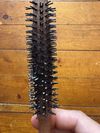community Peppermint Oil vs Lavender Oil vs Rosemary Oil vs Pumpkin Seed Oil- Which one/ combination is best?
People discussed using peppermint, lavender, rosemary, and pumpkin seed oils for hair regrowth or thickening. They shared personal experiences and recommendations on using these oils alone or in combination.
